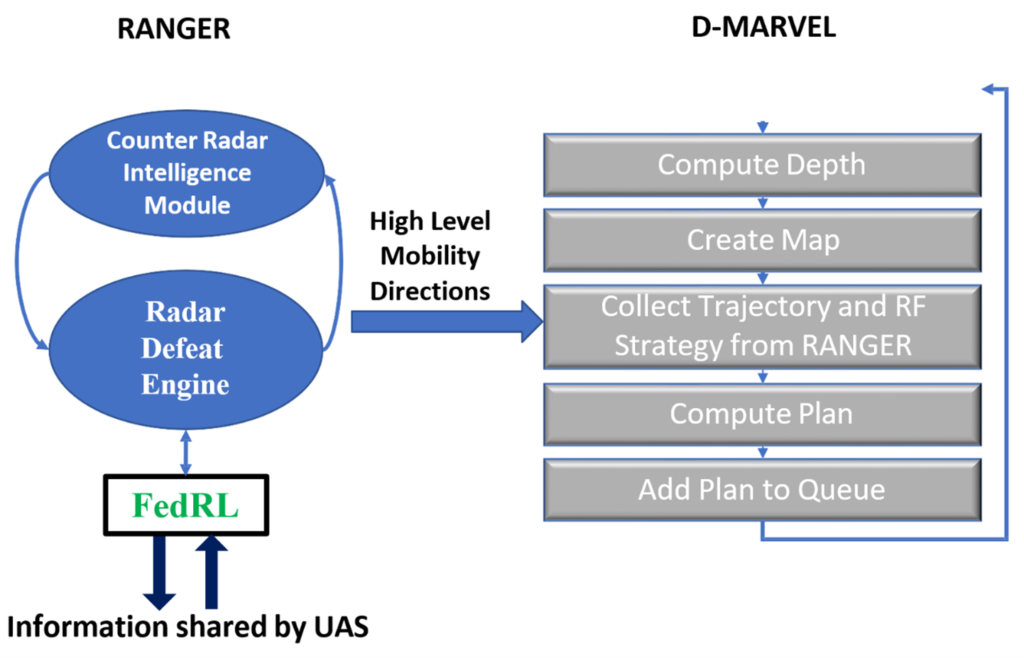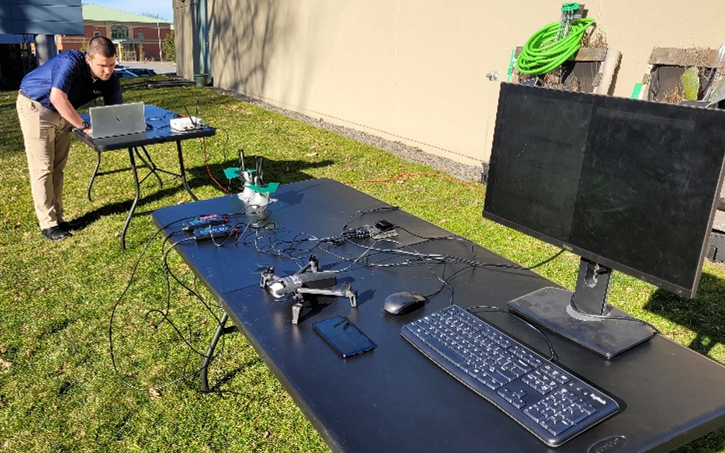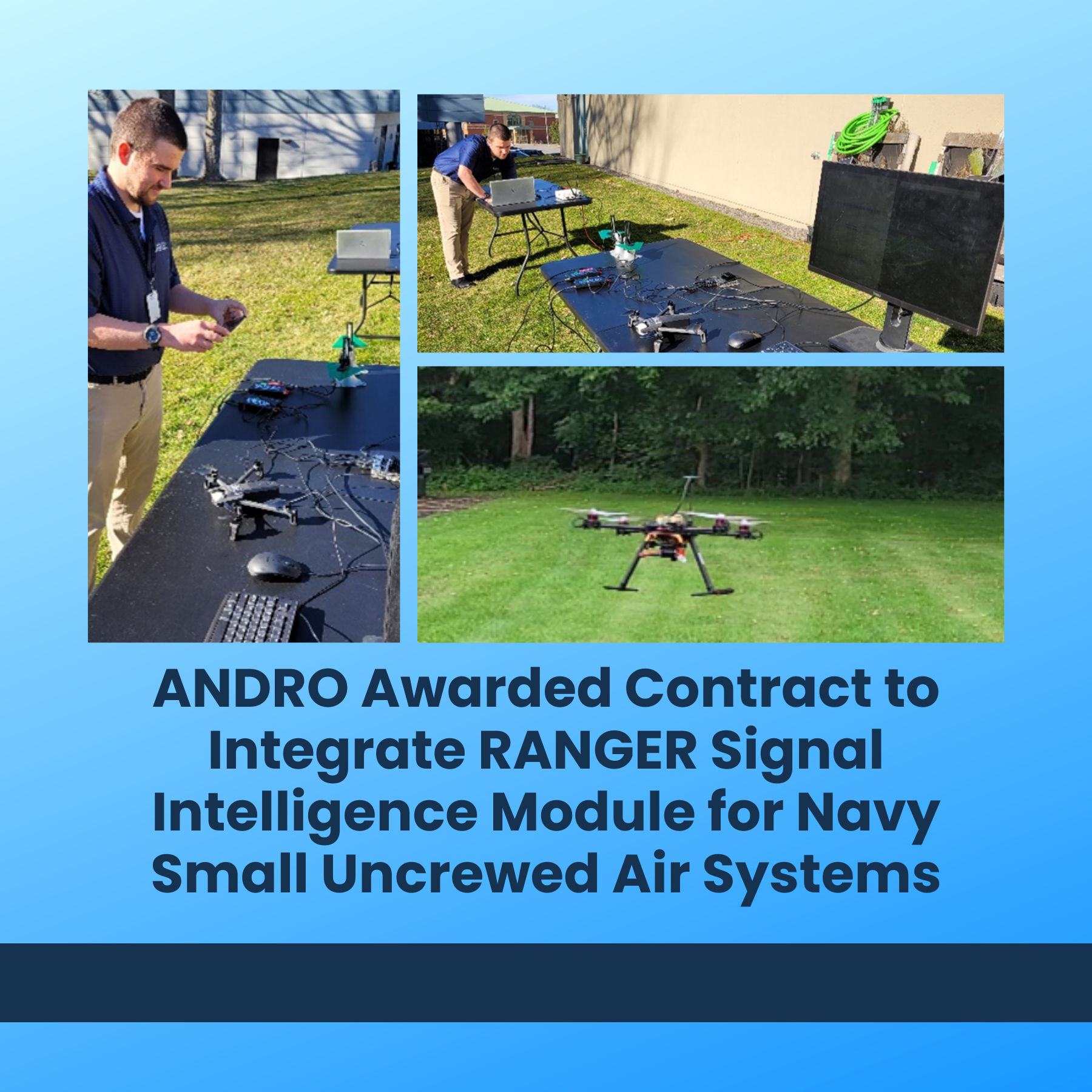ROME, NY — The U.S. Navy has awarded ANDRO Computational Solutions, LLC of Rome a Phase II Small Business Innovation Research (SBIR) contract with a base value of $1.3 million plus additional funded options, to develop a new type of autonomous radio frequency signal intelligence (RF-SIGINT) capability for uncrewed air system (UAS) platforms or aerial drones, called RANGER ― Robust Autonomy for NeGation of Enemy Radar. The work will be performed by ANDRO’s Marconi-Rosenblatt Artificial Intelligence Innovation Lab team in Rome led by Dr. Jithin Jagannath, Lab Director and Chief Scientist – Technology Sector.
The RANGER award builds upon an earlier investment by the Navy of almost $1.5 million for ANDRO’s D-MARVEL system, a complement to RANGER, for a total funding amount to ANDRO approaching $3 million to advance UAS autonomy goals. RANGER and D-MARVEL both provide for next-generation machine learning (ML)-based UAS platforms that can autonomously perform a variety of tasks and conduct missions in diverse environments with little-to-no human intervention. RANGER focuses on RF-SIGINT applications whereas D-MARVEL leverages human visual cues with artificial intelligence (AI) for human-machine teaming performance.

For RANGER, the ANDRO AI Lab team will apply novel ML techniques for enhancing radar detection and classification and will integrate the low cost, small-form-factor payload with small UAS host platforms. RANGER represents the government’s focused investment in the development and deployment of lightweight, next-generation RF-SIGINT payloads for use in small military drones.
According to Jagannath, RANGER’s overarching goal is to bolster Manned-UnManned Teaming (MUM-T) to provide superior battlefield agility and improve platform survivability. The design, integration, and flight testing of RANGER on UAS hardware is spearheaded by ANDRO engineers Sean Furman and Tyler Gwin with guidance by Anu Jagannath, Associate Director of ANDRO’s AI Lab and the company’s machine learning-enabled SIGINT subject matter expert.
ANDRO president Dr. Andrew Drozd explains that the impetus for human-machine teaming is driven by the need to migrate from a UAS platform that is strictly controlled by a human operator who must orchestrate its flight to effectively achieve a particular mission objective―representing a human-in-the-loop approach. Rather, Jagannath and his team are focused on an end-to-end, human-on-the-loop framework that leverages specialized machine learning techniques to provide autonomy, adaptability, and highly effective human-machine teaming performance based on experiments recently conducted at ANDRO’s lab facilities.
Jagannath stated, “The RANGER technology sits at the intersection of ANDRO’s Marconi-Rosenblatt Lab expertise in UAS autonomy and efficient machine learning-enabled signal intelligence. The AI lab team sees RANGER as the next-generation autonomous MUM-T planning and coordination system that will be engineered for operation in dynamic and austere application environments.”

Drozd anticipates growth in business arising from the work to incorporate the solution into advanced UAS platforms during the next phases of advanced research and development. “RANGER is at the core of ANDRO’s strategic plan to continue to expand the company’s research portfolio and footprint, including the research activities of the Marconi-Rosenblatt AI Innovation Lab,” said Drozd.
ANDRO is a privately owned company established in 1994 focused on scientific research, development, and the application of advanced computer software in the domains of radio frequency spectrum exploitation, secure wireless communications, cognitive radios, advanced radar data fusion, and sensor resource management. Visit www.androcs.com for more information.

Navy awards $1.3 million contract to ANDRO (cnybj.com)

ANDRO in Rome awarded $1.3 million U.S. Navy contract | News | romesentinel.com

